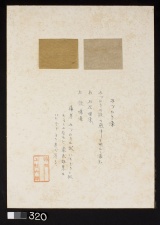Difference between revisions of "Mizuhiki (Persicaria filiformis) - right (320 R)"
Jump to navigation
Jump to search
(username removed) |
(username removed) |
||
| Line 5: | Line 5: | ||
| 320 | | 320 | ||
|- | |- | ||
| − | ! scope="row"| | + | ! scope="row"|Uemura number / title |
| − | | | + | | ; "Haze-some 25" |
|- | |- | ||
! scope="row"|Folder location | ! scope="row"|Folder location | ||
| Line 41: | Line 41: | ||
| - | | - | ||
|- | |- | ||
| − | ! scope="row"| | + | ! scope="row"|Uemura's notes |
| Mizuhiki looks similar to Itadori, but its dyeing capability inferiors to the latter. | | Mizuhiki looks similar to Itadori, but its dyeing capability inferiors to the latter. | ||
|- | |- | ||
| − | ! scope="row"| | + | ! scope="row"|Uemura's date |
| Kyoto | | Kyoto | ||
|} | |} | ||
| − | [[Category: | + | [[Category:Uemura dye archive]] |
Revision as of 06:20, 24 July 2013
| Museum number | 320 |
|---|---|
| Uemura number / title | ; "Haze-some 25" |
| Folder location | 4th shelf |
| Sample location | right (320 R) |
| Fiber type | silk |
| Color | gray |
| Dyestuff (Japanese common name) | みづひき : Mizuhiki |
| Dyestuff (botanical name) | Persicaria filiformis (Thunb.) Nakai ex W.T.Lee (Polygonum filiforme Thunb.) |
| Plant part | root / dried (?) |
| Dyestuff extraction | boiled in water |
| Auxiliary agent in dye bath | - |
| Mordant | lime water |
| Other auxiliary agent | - |
| Uemura's notes | Mizuhiki looks similar to Itadori, but its dyeing capability inferiors to the latter. |
| Uemura's date | Kyoto |
